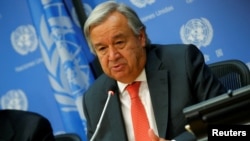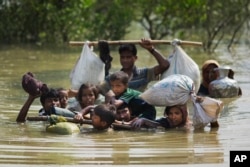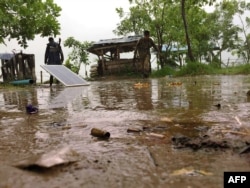U.N. Secretary-General Antonio Guterres said Wednesday the displacement of hundreds of thousands of members of Myanmar's Rohingya community can only be described as ethnic cleansing.
"When one-third of the Rohingya population has got to flee the country, can you find a better word to describe it?" Guterres responded when he was asked if the term ethnic cleansing applied to the plight of the Rohingyas, most of whom are Muslims, in the overwhelmingly Buddhist Asian nation.
"I call on Myanmar authorities to suspend military action, end the violence, uphold the rule of law and recognize the right of return of all those who had to leave the country," Guterres said at United Nations headquarters in New York. "Muslims of Rakhine state must be granted nationality or, at least for now, a legal status so they can lead a normal life."
"I believe that we are facing a very dramatic situation, and that is the reason why I appealed to the Security Council to seriously consider the situation," the secretary-general said.
With concern growing worldwide about the situation in Myanmar's western Rakhine state, the country's de facto leader, Aung San Suu Kyi, has canceled her original plans to travel to New York for the annual U.N. General Assembly meeting beginning next week. The former Nobel Peace Prize winner, revered for her political campaign against the military junta that formerly ruled her homeland (then Burma), has been criticized for a failure to do more to stop the current round of violence.
Government officials in Myanmar consider almost all of Rohingyas to be illegal immigrants from Bangladesh, even those who have lived in the country for generations. Violence involving the Rohingyas has been going on for a long time, but it grew to a crisis last month.
Authorities in Myanmar said a group of Rohingya militants attacked dozens of police posts and an army base on August 25, reputedly in an attempt to retaliate against persecution targeting them.
About 400 people were killed in subsequent clashes, many of which were deliberate attacks by members of Myanmar's security forces, according to members of the Rohingya minority. The government said its forces were engaged in a military counteroffensive against alleged "terrorists" involved in the attacks three weeks ago.
The violence has spurred an exodus among Rohingyas living in Myanmar, a community of about one million people. Nearly 400,000 have fled toward Bangladesh, which borders Rakhine state, where almost all Rohingyas live.
Secretary-General Guterres wrote to the Security Council on September 2, expressing his deep concern about the unfolding crisis in Myanmar and urging the council members to take action. Following a private briefing by the United Nations political chief, the Security Council issued a statement about the Rohingyas' plight. Ethiopian Ambassador Tekeda Alemu, who is presiding over the council this month, said the 15 member nations expressed concern over the violence that occurred during the Myanmar security forces' counteroffensive.
The Security Council members "called for immediate steps to end the violence in Rakhine, de-escalate the situation, re-establish law and order, ensure the protection of civilians, restore normal socio-economic conditions and resolve the refugee problem," the Ethiopian diplomat said.
Alemu said the Security Council noted the Myanmar government's commitment to provide humanitarian assistance to all displaced individuals without discrimination, and called for that commitment to be fulfilled.
The forthcoming General Assembly session is scheduled to review the situation in Myanmar during two special meetings in the coming days and weeks. Many diplomats will attend a session hosted by the Organization of the Islamic Conference (OIC) and chaired by Turkey, and a second, smaller group of foreign ministers will convene at the invitation of their British counterpart.
A spokesman for the Myanmar government, Zaw Htay, confirmed Wednesday that Aung San Suu Kyi will not travel to New York but will remain in Myanmar to deal with the ongoing security situation.
The spokesman said the Nobel laureate, who serves both as Myanmar's foreign minister and as a "special adviser" to the government, would deliver a televised address next week to "speak for national reconciliation and peace." The speech will be seen as her first detailed public comment about the crisis involving the Rohingyas.
Aung San Suu Kyi, who was held under house arrest for years by Burma's former military rulers, has been known as an icon of democracy, but her recent comments have been seen by many as apparent indifference to the plight of her country's minority Muslims. She has dismissed many accounts of the events in Rakhine state as "fake information" designed to promote the interests of "terrorists." That stance has drawn scorn from other governments and human-rights activists, including a number of her fellow Nobel Peace laureates.







